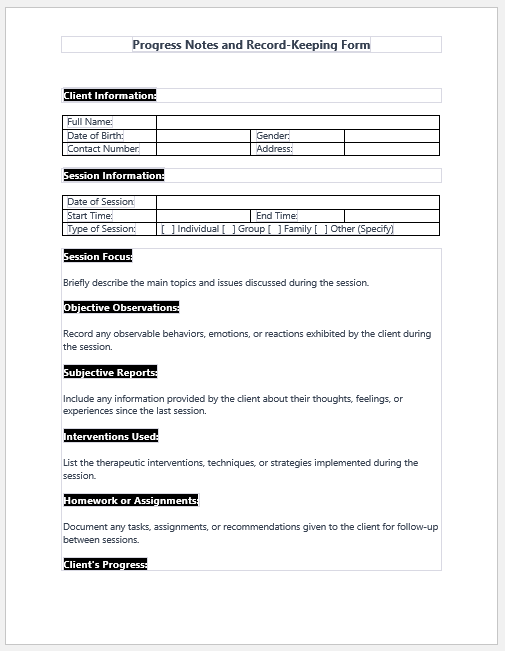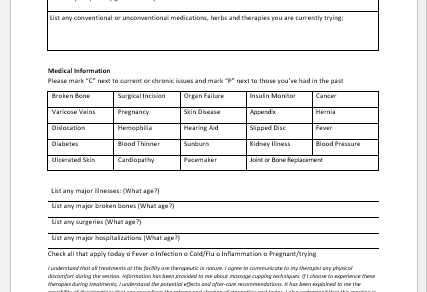Healthcare professionals often take notes that are usually used for recordkeeping purposes. These notes are helpful for them to remember important details about each patient and see how well a patient is recovering.
A therapist or mental illness expert has to deal with numerous patients in a single day. Therefore, they cannot remember the diseases or notable symptoms of every patient. Therefore, they create notes, which help them later on.
What is a progress note and record-keeping form?
Usually, people create journals when they have to take down notes and use them as a record that they can check at a later stage. Therapists often have a one-on-one session with their clients, and there are so many details that the therapist would like to keep in his database.
A record-keeping form serves as a journal in which the data can be recorded for an indefinite period. Once this form has been filled out, the data provided by the doctor is transferred to the digital database, where it can be accessed at any given time.
What are the benefits of using record-keeping forms for development?
Therapy programs are often designed in such a way that a counselor has to talk to his patients and collect information. There are usually several sessions and this journal form brings a lot of benefits to its users:
It helps in follow-up sessions
Psychologists usually have several sessions with their patients, and they have to lead the treatment from one phase to another in each session. This is possible only when the therapist has kept the records of the previous session and is in a position to start from where he left off. Follow-up sessions become super easy with the use of a record-keeping form.
It serves as a time-saving tool
The program notes document keeps all the notes in a single place. So, when the doctor needs data about a particular patient, it is very easy for him to access it as the data is stored in the database.
This saves a lot of time for the patient, as he is not required to ask the patient about so many things again that he has already told them in the previous session. This also results in an understanding of the problems and needs of the client who has visited him for therapy.
It acts as a reminder
Every healthcare professional needs to take notes as a reminder. For instance, if the therapist has asked the patient to get his screening done, this record-keeping form will help him remember this in the next session and he will be able to plan the treatment accordingly.
The recordkeeping for a psychologist is a useful tool because it helps him do what he would not have done otherwise.

Form File Size: 46 KB
What elements are added to the therapist notes form?
This form helps a therapist collect the following information:
Details of the patent:
The therapist takes down details regarding the patient, such as his name, date of birth, gender, etc. These details are kept to help the therapist give individual attention to each of his patients.
Observations or symptoms:
Therapists generally ask their patients about the symptoms they are experiencing, which helps in diagnosis. Some therapists also record observations and symptoms in every session and then compare them with the previously noted observations to see the difference the patient is experiencing due to the treatment.
Medication:
The counselor can also see the names of the medicines he has prescribed to the patient previously. The doctor can make several critical decisions regarding changing the medicine or its dosage to make the patient see more benefits from the prescribed medicine.
The bottom line:
The notes or record-keeping form is used by almost every doctor in one form or another. They like to keep notes and keep them with them, which helps them create a personalized treatment plan for every patient.
This form makes it easy for them to take notes because there are only empty fields that are filled, and every piece of information is collected by the doctor without any extra effort. However, using this form frequently and carefully can help reap fruitful results from it.
- Diabetes Travel Letter
- Persmission Letter for Eatables in Office due to Diabetes
- Diabetes Letter to Employer
- Trackers for Medical Facilities
- Nursing Documentation Templates
- Letters for being Unfit to Travel
- Mental Health Evaluation Forms
- Forms Used by Pediatricians
- Various Forms Related to Pregnancy Verification
- Common Forms Used by ENT Specialists
- Patient Registration Confirmation Messages
- Quotation Letter for Medical Services
- Mental Health Letter by Doctor
- Excuse Letter for Absence due to Medical Checkup
- Response Letter to Feedback on Improvement in Hospital
- Letter to a Mother Who Miscarried
- Patient Feedback Letter Complaining on Issues or Incidents
- Letter to Family about Miscarriage


